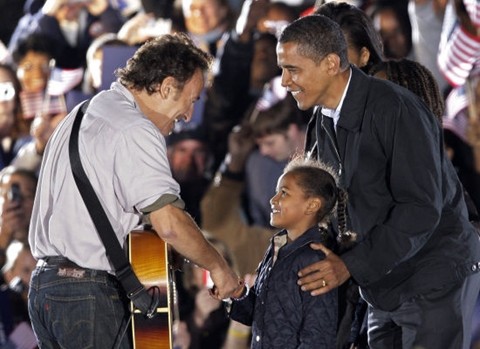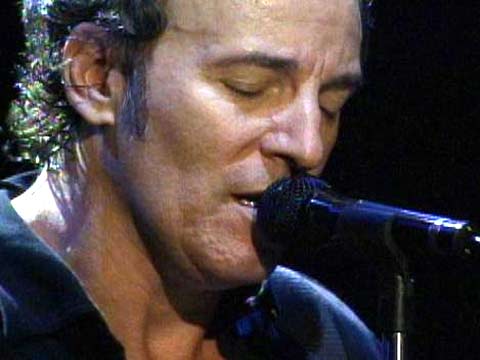While many bands have legions of fans, few (if any) have garnered the type of following that Bruce Springsteen has. Long before he became famous, those who knew his work were already nothing less than devotees. Decades later, those numbers have skyrocketed but, for many, the devotion has not waned. That was true of me…until now.
I don’t in any way repudiate Springsteen’s greatness. He is, in fact, the greatest poet of my lifetime and, I would enjoy arguing perhaps the best since Shakespeare. I don’t have room here to defend that statement – nor is it the purpose of this paper – but I am far from the only one who has taken Springsteen’s works so seriously. There are two Harvard professors, a leading theologian and one of the nation’s premiere social and political journalists (to name just a very few) who have written books on Springsteen – the artist, not the man – and his literary and moral contributions. I, too, have considered writing one along the lines of The Leadership Lessons of George Washington and The Tao of Pooh – the often simple but essential lessons that I have taken from Springsteen’s lyrics and incorporated into my own life for the better.
Through the years I have been a fan – in many cases a big fan – of other acts as well. I think Paul Simon is a brilliant lyricist and musician and Bernie Taupin who, along with Elton John, has created some of the greatest songs in the soundtrack of my life are, too. Billy Joel has been unparalleled at catching and throwing back the zeitgeist of the times and so on. But only Springsteen has been a moral guide and to this day I have no doubt that he is, outside my closest family and friends, one of the two people who has most helped me to be the man I wish to be. The other, you may find of significance, is Dennis Prager.
Unlike any of the others, Springsteen has always seen his career as a body of work and he saw that body of work as a mission to offer people exactly what he, in fact, offered me, a blueprint for navigating the difficulties of life. These lessons were often simple – but aren’t the best always that way? – and what made them great was that they were accessible and could be replicated by any and all. Springsteen’s characters live in the real world with real world problems, problems that Springsteen would address with calls to action.
Much of Springsteen’s works – especially through the first third of his career – were centered around the automobile. Everything changed depending on who (if anyone) was in the passenger seat, what was on the radio, whether the windows were open or closed, the condition of the road, the condition of the tires and so forth. Like old-style Westerns, the locale didn’t change much, but thousands of different stories could be told.
It was not a coincidence that Springsteen’s characters spent so much time in and around cars for, while it’s not a novel conceit, life is a journey, and the car, for Springsteen, was the means for getting from here to there in your life. In “Thunder Road,” then, Springsteen’s car is not all supped up and gleaming telling us he’s just average guy. The losers, meanwhile – those stuck in their perpetual rut “Haunt these dusty beach roads in the skeleton frames of burned out Chevrolets.” Even the number of lanes and their composition serve as another clue in the telling of the tale. Springsteen’s on a two-lane highway. Not bad, but just one accident – by anyone – and things get backed up.
Nor is it coincidental that another word for car is “automobile” – quite literally self (auto) moving (mobile.) This, more than anything, brought Springsteen his legion of fans: the idea that the individual has the power to make choices that will affect his life. It came offered independence and opportunity.
The flip side of this is that choices have costs and consequences and there is no single concept that appears in Springsteen’s canon more than one iteration or another of “If you want it, you take it and you pay the price.” It’s a promise … and a warning.
But, just as actions have consequences, so, too does inaction. It’s not enough to dream, you have to act. (And, since there’s a cost to action you have to act wisely.) It’s not always that hard. In “Darkness on the Edge of Town,” Springsteen says “Where life’s on the line, where dreams are found and lost, I’ll be there on time and I’ll pay the cost.” He reiterates this message in “Badlands” (“Talk about a dream, try to make it real”) and, again, in “Prove It All Night:”
“Everybody’s got a hunger, a hunger they can’t resist/There’s so much that you want, you deserve much more than this/well if dreams came true, ah, wouldn’t that be nice/but this ain’t no dream we’re living on through tonight, so, girl, you want it, you take it and you pay the price.”
In the song many consider Springsteen’s masterpiece – and which I believe is the greatest poem ever written (made only that much greater by musical turns that Robert McKee could use as an example of “integration” in his story — structure class) — “Thunder Road,” Springsteen is imploring a women he knows to join him in his trip down life’s highway. He – in themes that repeat throughout his body of work – knows that life’s better (and one’s chances for success, however one defines it, improved) with a pal, a confidant, a coconspirator, a lover and a friend beside you (in another song he’d say it point blank: “Two hearts are better than one. Two hearts, girl, get the job done.”)
They’re not “beauties” and they’re not “heroes,” they’re regular people who are going to take on what comes and, hopefully, make it to where they want to go. At this point, Springsteen has done what he can do, he’s made his case to her, he’s opened the door but says, “The door’s open, but the ride it ain’t free.” What it will cost “Mary” is commitment. Nothing more and nothing less.
Mary remains reluctant throughout and at one point Springsteen lays out her choices for her: “You can hide ‘neath you covers and study your pain; make crosses from your lovers, throw roses in the rain. Waste your summer (youth) praying in vein for a savior to rise from these streets.”
But gods and angels don’t do those things on this earth and, unless she trades in those “wings for some wheels” she’s going to grow old having gotten nowhere and having never tried. “Wings” may fly you over all the troubles and travails of life, and “wheels” may hit every pothole along the way, but only one of them is real and only one of them offers any hope or solace.
Springsteen repeatedly talks about “the promised land” – intentionally never exactly defined, left up to each and all to decide what that land is like for themselves – but the “promise” is not an entitlement, it’s part of a deal. The riders have responsibilities to be there on time and to help pay the costs.
But Springsteen’s greater greatness derives from his knowledge that the end is somewhere “down the road” and there are things we can do in the here and now to make our lives better. Thus, Springsteen gives us a scene reminiscent of the end of the movie “The Graduate,” when, after all the tumult, Benjamin finally gets the girl to go along with him (it’s a bus not a car but it’s the same moment.) Alone, now – pulling out of their own “town full of losers” and going down their own “thunder road” Benjamin catches his breath and asks (with a look), “okay, what now?”
So, after winning the girl and committing to the ride, Springsteen asks “What else can we do now?” And then he gives the most wonderful answer imaginable, they can “Roll down the window and let the wind blow back your hair.”
Springsteen’s promise is in the macro and the micro and it’s that if you do the things that you can do – if you make the wise choices, if you’re there on time and you pay the cost – there’s no guarantee of “the promised land,” but it’s your only hope and there are joys to be had along the way.
None of this is evident in Springsteen’s most recent works (or public statements.) There is no longer a blueprint to be found, only a collection of characters “hiding ‘neith their covers studying their pain.” To put it bluntly, they’re a collection self-pitying and whiny babies” upset because, for the first time in their lives, they’ve hit a patch of “rocky ground.”
And rather than using his own success to testify to the promise – if you make wise choices, commit to your friends and lovers, show up on time and pay the cost – you can go from bus driver’s son to a president’s pal, he’s testifying to the exact opposite of not only his own truth, but the truth.
Springsteen has gone from the voice of real hope which requires wise change, to the voice of entitlement and being forever stuck there. It’s not surprising that one should find him an honored guest in the Obama White House and a staunch voice for today’s Democrat Party.

It’s not America that has broken its promise to Springsteen, it’s Springsteen who has broken his promise to us all. And, early on, Springsteen had it right: “When the promise is broken, you go on living, but it steals something from down in your soul.”
Bruce, after three decades of taking your advice and being better for it, may I offer mine to you and those who stand by your side on the Left. You’re not “shackled and drawn” – it’s a clever line and you sing it beautifully – but you’re free to make your choices. I suggest you use your free hands to roll down the window and let the wind blow back your hair.
This article originally appeared at FrontPageMag.com

COMMENTS
Please let us know if you're having issues with commenting.